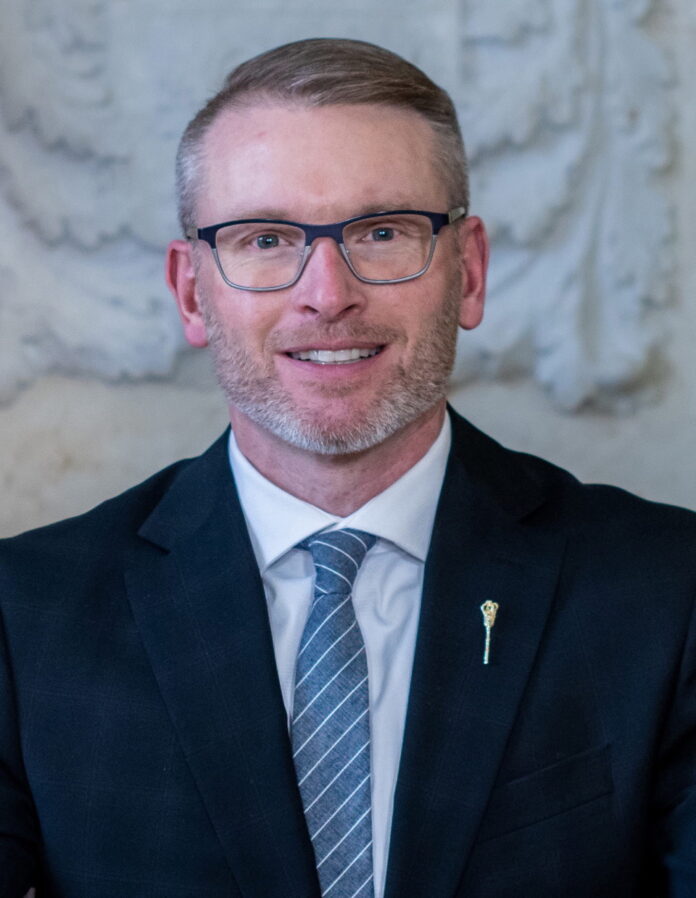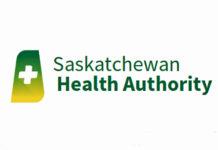By Matthew Liebenberg
Swift Current MLA Everett Hindley has been given responsibility for a major portfolio in a significant cabinet shuffle by Saskatchewan Premier Scott Moe on Aug. 29.
Hindley is now the minister of health with oversight of a key service of great importance to provincial residents.
“I’m really looking forward to it,” he said. “I really appreciate the opportunity to serve in this new capacity as the minister of health. It’s a big responsibility and one that I take very seriously.”
He has been a member of the provincial cabinet since November 2020, when he was appointed as minister of mental health and addictions, seniors and rural and remote health. In that role he worked closely with Paul Merriman, who was the minister of health until this cabinet shuffle.
Merriman has been given a new responsibility as minister of corrections, policing and public safety and minister responsible for the Firearms Secretariat. Hindley felt his new duties as minister of health will provide him an opportunity to build upon some of the things he worked on previously in tandem with Merriman.
“So I have a bit of a sense of what’s happening in this bigger portfolio, but we’re looking forward to advancing some of the things we’ve done there,” he said. “We’ve made some strides and some improvements in health care, but we know we still have some challenges out there that we need to address, and committed to tackling those head-on.”
He is realistic about the challenges he will face and he noted that health is a massive portfolio with the biggest budget in government. That was the reason for a decision taken by former Premier Brad Wall to split the portfolio and to create a minister for rural and remote health.
Hindley’s focus in his previous ministerial role was on health care services in rural communities while Merriman gave attention to the services in the larger urban centres of Saskatoon, Regina and Prince Albert.
However, Hindley developed a good sense of what was happening in the major centres and in the overall health portfolio due to the manner in which the duties of the two ministers are structured.
“I thought it worked very well, because even though we had two separate ministers, we were sharing the same officials at the Ministry of Health on files, regardless of whether they were issues that we were facing in Regina and Saskatoon or in rural and remote communities,” he said.
These arrangements for joint briefings will continue when Hindley now works in his role as minister of health in association with Moose Jaw North MLA Tim McLeod, who enters cabinet for the first time as the new minister of mental health and addictions, seniors and rural and remote health.
“He and I will meet regularly,” Hindley said. “Our offices are actually side by side in the legislature. We’ve formed a relationship since he was elected. He’s the first-time MLA, elected out of Moose Jaw in the 2020 election. We’ll continue to have joint briefings where we can have any number of items on the agenda. Some of them might be specifically under the health portfolio. Some of them might be under the rural and remote health portfolio, but both ministers are at the table hearing those issues and have the opportunity to weigh in.”
A similar approach has been followed for ministerial briefings with the Saskatchewan Health Authority (SHA) and it will also continue.
“We would have regular meetings and briefings with the SHA, but it would be both ministers meeting with the SHA leadership at the same time,” he said. “It actually works quite well, because there is a good relationship that way between the two ministers so that we’re both very much in a loop, not only on our own specific portfolios, but we do have a bit of a sense of what’s going on in the other minister’s portfolio as well, and kind of lean on each other that way too. So it’s a very good system.”
Hindley felt he will benefit in his new role from the relationships he created over the past three years during interactions with various stakeholders and roleplayers. He referred to road trips in the summer of 2022 to tour health care facilities, meet frontline health care workers and talk to community leaders.
“That sort of engagement was very important, because that helped formulate for us the new Health Human Resources Action Plan, which we launched almost a year ago,” he said.
He also mentioned his more recent visits only three weeks before the cabinet shuffle to communities in southeast Saskatchewan. He felt such visits are really useful to develop an understanding of local issues and priorities.
“So I was able to form a lot of relationships that way with community leaders, but also those that have important roles in health care,” he said. “I’m glad to have those relationships. Those are already established and there’s others that I may have been part of meetings with Minister Merriman. So it won’t be too much of a jump to be able to move from my former role into this one.”
The cabinet shuffle included the appointment of nine legislative secretaries. Prince Albert Northcote MLA Alana Ross was named the legislative secretary to the minister of health. She previously worked as a nurse in both Alberta and Saskatchewan.
“I’m really looking forward to working closely with Alana, because she brings something to the table that’s unique,” Hindley said. “She is a former health care worker and has worked in two different provinces where the systems can be a little bit different from time to time in terms of how they operate. Alana is going to be just an absolutely excellent resource for me and for Minister McLeod as well.”
According to Hindley the provincial government is working on health care enhancements across the province. The Ministry of Health budget for 2023-24 is $6.9 billion, which is the largest ever budget for health care in Saskatchewan.
It includes funding for various capital projects, but he felt the most important work being done is the ongoing focus on health human resource challenges through the four-point action plan to recruit, train, incentivize, and retain health care workers.
“We’re going to continue to build upon that,” he said. “We’ve had a number of successes as a result of that and some of the other initiatives that we have undertaken. …So that work will be very important for me as the minister now to make sure we continue to lead the way when it comes to filling those gaps in our health human resources.”
Recruitment missions resulted in conditional letters of offers to 411 registered nurses from the Philippines and a number of Ukrainian newcomers have been hired to join the health care workforce. More training seats have been added to train health care workers in the province, and a new incentive program was created last year for hard-to-recruit designations. Another initiative has been the creation of 250 new enhanced positions, mainly in rural communities, and 186 of those have already been filled.
“We know we still have some challenges to overcome there,” he said. “While we have been able to eliminate some of the temporary service disruptions, we know that there are still others that need to be addressed. So we need to very aggressively continue to work on that and make sure that we’re doing everything we can to support the very reliable healthcare workers we have that have been serving us day in and day out for so long, but also to help bring more staff to their team, which is what they’re very much asking for.”
He noted that highly specialized health care designations are a specific recruitment challenge. The presence of only a single anesthesiologist at Cypress Regional Hospital is causing service disruptions.
“That is a priority for me and it has been for some time, both in my capacity as the minister for rural and local health, but also as the local MLA,” he said. “We have a lone anesthesiologist in Swift Current. We have funding in place for more than just that.”
New incentives have been developed to recruit them to come to Saskatchewan. There is a $200,000 over five-year incentive program for anesthesiologists to establish a practice at regional sites such as Swift Current or Yorkton and a $100,000 over five years incentive program for establishing a practice in Regina or Saskatoon, as well as a relocation amount of $25,000.
“We’re using both in-province and out-of-province locums to try and help stabilize some of the disruptions right now,” he said. “We’re offering those locums increased rates to what they’re being paid to provide coverage in regional sites like Swift Current plus mileage and travel time and accommodations. We know, just based on our contacts, that there’s a shortage of anesthesiologists across the country, but we’ve asked the SHA to do everything they can to make sure they permanently recruit anesthesiology resources to Swift Current and every other facility in Saskatchewan that needs them.”






